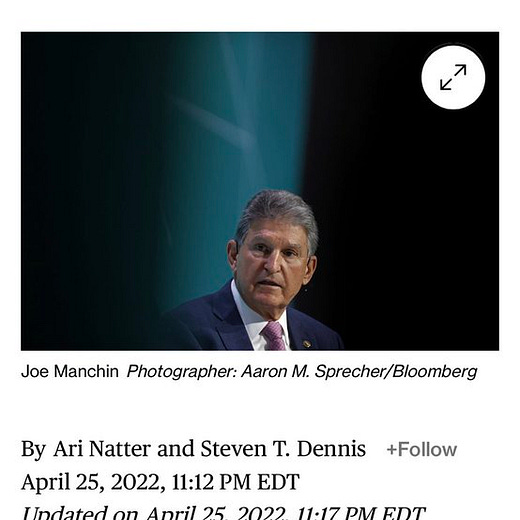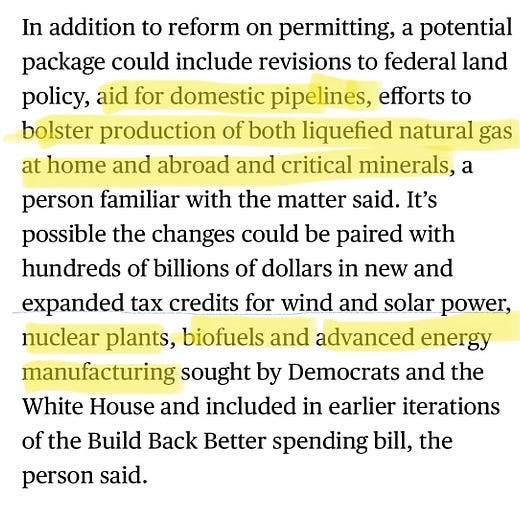Thank Big Oil for this “American way of life”
Sociologist Robert Brulle talks fossil-fuel-fantasies, climate change as a political crisis, and Big Oil’s role in defining America
Emily Sanders is the Center for Climate Integrity’s editorial lead. Catch up with her on Twitter here.
Well, no need to sugar coat: what were once worse-case scenarios are becoming terrifying realities. An extreme and out of touch U.S. Supreme Court majority is poised to overturn Roe v. Wade, allowing states to strip basic human rights away from people seeking abortions and reproductive healthcare. At the same time, Joe Manchin, the fossil-fuel-funded senator from West Virginia who obstructed the Biden administration’s early attempts at meaningful climate policy, is now holding his vote for any climate action hostage in exchange for a “compromise” that would greenlight more pipelines and production for the oil industry, potentially locking us into catastrophic and irreversible consequences.
These outcomes benefit the power and profits of a select few at the expense of the lives and freedoms of many. They are also further evidence of what our country’s politics look like under the stranglehold of the fossil fuel industry.
That’s right: Big Oil was a major funder of the same senators who ushered anti-abortion justices onto the Supreme Court. And lest we forget, Amy Coney Barrett, one of the justices reportedly set to strike down Roe v. Wade, has family ties to Shell Oil and the American Petroleum Institute and received hefty support from front groups sponsored by the fossil fuel industry. She and other conservative justices brought to power by corporate special interests are expected to be an asset to the patriarchy and polluters alike, and could aid the industry in everything from their fight to avoid trial in climate liability lawsuits to disrupting the EPA’s authority to regulate greenhouse gas emissions.
With this deluge of consequences, academics, journalists, advocates and elected officials are shining more light on the ways Big Oil gained control over our politics — and how the industry continues to exercise that control: whether it’s putting their allies in power, lobbying against policies that would lessen climate harm, or using deception to hijack the debate around the role of fossil fuels in our society.
Dr. Robert Brulle, sociologist and visiting professor at Brown University, has been working to tell that story for more than a decade. His research focuses on understanding what he calls the “climate change countermovement”: the corporate and political forces still rallying to kill climate action today.
Last month, Brulle published new research about the Global Climate Coalition, an industry lobbying network from 1989 to 2001 that launched some of the earliest climate disinformation campaigns to thwart international climate agreements, and whose members included Exxon and the American Petroleum Institute. Documents unearthed in Brulle’s research were featured in PBS’s three-part docuseries, “The Power of Big Oil” (you can now stream the third and final episode here).
Our interview, edited for length and clarity, is below.
What were some of the biggest takeaways for you from this most recent research about the Global Climate Coalition and early efforts to stall climate action?
I think the popular misconception is that the only thing they did was deny the science. They did science denial, no doubt about it. But that wasn't all, and I think if you only focus on that, you miss the subtlety and the sophistication of their arguments. I would say that was maybe 15, 20 percent of their effort. If you look at the rhetoric of the GCC, it's [also] pro fossil fuel propaganda.
My research has shown me that oil companies, over the last century, have fostered and promoted the hell out of the argument that fossil fuels bring us the good life. And that if you're impacting fossil fuels, you're going to attack the American way of life. You do that and you'll be cold and starving in the dark. It's going to cost you a lot, cause unemployment — all these bad things are gonna happen. So don't mess around with fossil fuels. I think it was a very clever approach from the GCC — they used economic arguments ad nauseum. For me, that was the biggest part of their argument. And you can see a lot of those same arguments today.
Where are we seeing those arguments today?
If you look at API’s advertising, they just celebrate the hell out of contributions that fossil fuels make to the American way of life. They had this whole big schtick about energy poverty, and that we need to bring fossil fuels to people so that they can have a good standard of living. If you look at their advertising for 30 seconds you’ll see that basically they don't even want to deal with climate change. ExxonMobil will say look, we're making this algae, we're going to do carbon capture and sequestration, and this is gonna deal with all of our issues, but look at all the good things that oil does for you.
The notion of fossil fuels equals the good life is a constant factor in their propaganda. And there is truth to the idea that we're addicted to fossil fuels and that they’re integral to our way of life. Until you break that addiction, that structural power of the fossil fuel industry and its role in the economy and our political system is still there. That's what makes climate change mitigation so difficult, and I think the oil companies know this.
How should research like yours inform the way we think about recommendations and guidance on climate policy?
I think we have many, many really applicable solutions to climate action. The problem is we can't implement them. And the reason we can't implement them is not a technical question. And it's not a natural science question. It's a political question, and it’s that we have overcome the opposition to climate action.
So if you want to go down the road, the first thing you gotta do is get the boulder out of the middle of the road. We finally convinced some foundations that this was a worthwhile research endeavor, and we set up the Climate Social Science Network [a network of social science researchers examining the current and historic political obstacles to climate action] to really start to fund scholars and to publicize their work. The GCC was the biggest coalition — it had a big impact, and a good place to start, but that's certainly not the only coalition that worked to stop climate action. We have to start accumulating all of this material and put it into an something that tells the story. We have to think about how we get our research out and engage with the public in a much more productive way.
We need to think about climate change as much more of a political issue and not as a scientific, technical, managerial issue. We need a political strategy. If you follow Senator [Sheldon] Whitehouse on Twitter, he says these things all the time – that we need to overcome the political obstacles. And I would say let's follow Senator Whitehouse’s advice on dealing with climate change.
You’ve said that you think these most recent documents you uncovered could be used by communities filing climate liability lawsuits against Big Oil. Are there other ways you think research like yours can and should be used to hold these companies accountable?
Absolutely. Fossil fuel companies have systematically tried to maintain control over our understanding of the role of fossil fuels, and their economic benefit, by trying to suppress the negative aspects of fossil fuels, which include air pollution and of course climate change. That way they can maintain cultural hegemony. They can define the ruling ideas of our time.
But we can challenge the dominance of these ruling ideas. You can have a good life with renewable energy. And in fact, fossil fuels equals climate destruction, and these guys have been trying to maintain that that's not true. By bringing this new evidence to the fore to show that the fossil fuel industry has systematically attempted to distort our understanding of climate change and the role of energy systems to maintain their economic benefit, we start to challenge their social license to operate. By showing that they’re liars, holding them accountable for their fraud, we start to degrade their political power.
ICYMI News Roundup





